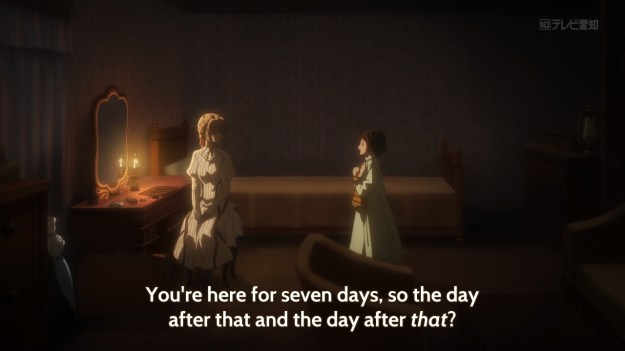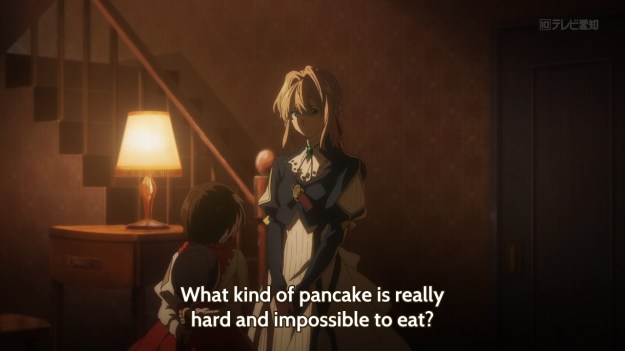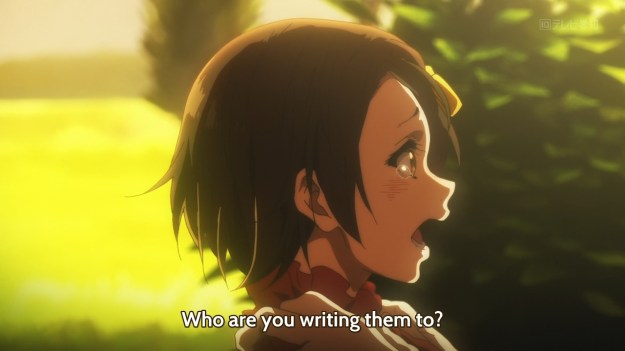Isn’t it odd that people keep thinking that Violet looks like an actual doll? Maybe it’s just odd to me, but I mean, this is an actual doll. You can tell, because it looks a bit creepy. Why do we often find dolls creepy? It’s because they like to inhabit that uncanny valley. Creepy dolls are unnerve us because although they look like us, they’re just different enough to set off some mental alarms. People’s fear of clowns supposedly work the same way, but I’ve personally found them scary. But I digress. What I’m trying to get at is how Violet is anything but creepy. There is nothing remotely uncanny about her, and this is why I always find it so odd that people find her doll-like. If she was simply pretty, they’d say so. I’m sure Princess Renner is supposed to be attractive, and yet, nobody has ever called her doll-like. Maybe Violet is doll-like, because she also seems so unemotional. But dolls are not just unemotional. There’s a certain vacant quality to them that truly makes them seem as though they lack a soul. On the other hand, although Violet is certainly not very expressive, I never get the impression that lacks a soul.
…
Boy, I kinda went on a tangent there. Let’s get on with the rest of the episode.
— Anyways, this episode appears to concern a little girl by the name of Anne. Whenever I see a little girl with a doll, I get the impression that she’s a rather lonely. Anyways, her mom appears to be terminally ill, and as a result, the parasites have come looking for their next big meal ticket. Violet’s sudden arrival, however, causes the mother to usher the parasites out the door. They try to protest — something along the lines of the girl not being able to live in such a mansion all by her lonesome — but the mother insists on them leaving right this instant. If I have to speculate, I bet the mother will die by the end of the episode. Is Violet here to draft a will? No, that’s not likely. Violet’s not a lawyer, but considering her mental acuity, she might make a decent clerk. Nevertheless, she’s probably here to help the mother write one final letter to her daughter. The girl is far too young to fully grasp the implications of her mother’s mortality. Ah man, this will probably be a tearjerker, huh?
— Anne’s incredulous reaction to Violet talking and drinking is cute, though.
— Yes, that would be urine.
— The mother wants to write “some letters.” I wonder if they’ll all be addressed to her daughter or if she has other people in mind.
— When Anne asks her mother who she’s writing to, the woman answers, “Someone very far away.” Oh boy, she’s a goner. I feel like I already know where this episode is going. She insists on her daughter not bothering them, too. These letters are definitely meant for the girl.
— One reason why I’m glad I’ll never have kids is that I don’t really want to have to lie to them. I understand why some white lies are necessary. You don’t want to tell your little girl that you will soon die. At the same time, I don’t think I could do it. I don’t think I could look into my child’s eyes and tell them that everything’s going to be okay when that is definitely not the case. And I know what you’re thinking: “Hey, you thought Claudia should’ve told Violet’s the truth!” It’s all about perception, really. Violet looks as though she’s old enough to face the truth. On the other hand, this little girl doesn’t. Maybe I’m wrong about that, but how will we ever know?
— I guess this is Violet’s first chance to interact with a child? Well, someone this young, anyway. Princess Renner was definitely still a child… just a slightly older one.
— The look Violet gives Anne made me laugh. It’s like she’s concerned for the girl’s mental health. “Um, you’re talking to an inanimate object…” Violet catches on quick, though.
— Yep, it’s a tearjerker. They say parents should never outlive their children. Children should never have to see their parents die either.
— One thing I gotta say, though: the show lacks strong side characters. Because the job takes Violet all across the continent, we are almost always introduced to new faces every week. And by the end of the episode, we’ll often have to say goodbye to these new faces for good. They’ll reappear every once in a while, but they’ll never have another major role to play. Cattleya, Benedict, Iris, Erica — we hardly know them. Well, we kinda know Erica a bit, but she too has pretty much fallen by the wayside since she got her own episode. What brings this up? Oh, just the simple fact that we’ll probably never see Anne again in any major capacity after this week’s episode. That’s a sad thought. These characters are so important to Violet’s development and growth and yet, they’re all just bit players confined to their respective episodes.
— To make matters even worse, Anne lost her father in the war. Oof. Someone get me off this wild ride of pain and sadness.
— Isn’t this everybody’s worst enemy? Ah, who am I kidding? I’ll probably get just five hours of sleep tonight. Of course, Violet’s just repeating what she heard from Cattleya, and it definitely sounds like something Cattleya would say.
— Violet smiles when she decides to tell the little girl a white lie. She’s definitely come a long way, but this is indicative of the show’s overall narrative problem. Remember when she suddenly went from being a clueless trainee to a brilliant ghostwriter in just one week? A lot of Violet’s character development actually occurs offscreen, so her journey doesn’t feel as rewarding. We don’t feel as though we have been present for some of her biggest victories. In the second episode, she barely graduated from the school for Auto Memoir Dolls. In the third episode, she helped Erica out, so she gets experience but nothing groundbreaking. In the fourth episode, however, Violet is suddenly experienced enough to write heart-rending love letters that the public found themselves swooning over. This anime definitely needed more episodes to tell its tale, but I fear that all those anti-peace rumblings will simply lead to another big KyoAni movie. The studio seems fond of movie-making nowadays.
— It’s a low-hanging joke, but I chuckled:
Anne: “Violet! Until Mom gets here, solve riddles, dance, play house, and catch bugs…”
Violet: “Miss. Please sort them in order of priority.”
— In any case, the girl quickly takes to Violet. After all, our heroine seems to have infinite patience, which is what you need in order to deal with children. But more importantly, the girl is very lonely, and she has no one her age to play with. The girl even confesses that she’d really rather just do all of those things above with her mother instead. She just wants to be in the room with her mother, but she can’t because those letters are meant for her to read later. When the mother said that she’s writing to someone far away, I suspect she means her daughter in the future. She won’t live for long, so she wants to keep sending letters to her daughter long after she’s gone. It’s heart-wrenching, because the audience knows what’s coming. Unfortunately, the girl doesn’t suspect a thing.
— Is the show being emotionally manipulative? It’s hard to say. I mean, the whole point of the story is to make us feel strong, heavy emotions. A better question to ask is whether or not the story feels cheap. I don’t know if I can answer that. At the very least, I’ll have to wait until I finish the episode first.
— The episode is laden with signs of autumn, and likewise, death isn’t far off. Even though there is still a lot of green everywhere, trees are starting to find themselves with dry, naked branches. Brown, dead leaves are beginning to appear everywhere.
— And right on cue, Anne’s mother’s condition continues to worsen.
— Still, I think this episode might be a little too long. I think succinctness would’ve delivered a stronger emotional impact. I feel as though I have to hear the girl cry out to her mother far too often that it’s becoming a bit redundant. It’s almost like we’re torturing the poor child, because we have 23 minutes to cover.
— This is also why I don’t want to have to lie to children. At some point, they’ll realize you’re lying, but they might feel as though they have to play along with you because you’re the parent.
— Anne has a good point: if her mother’s going to die, she may as well spend as much time with her daughter as she can. In fact, it feels like she doesn’t spend any time with her daughter at all. She’s either sleeping due to her illness or taking care of business with those guests that Anne hates so much. We want to believe that these letters are important — that when Anne gets older, she’ll truly appreciate the fact that her mother sacrificed their time together in order to write these letters. But is that really true? I don’t know. I don’t think we’ll ever know. Violet tells the girl that there’s a good reason her mother is busy with those letters, but that’s just one side of the story. It’d be one thing if her mother managed to set aside quality time for Anne everyday, but it really feels as though Anne is always alone.
— Well, after Violet leaves, it seems as though Anne finally gets her mother back… but for how long? Not very. This dark undercurrent cuts through the swelling soundtrack that feels so hopeful. And before you know it, winter comes and goes and the mother is gone.
— Apparently, the mother had Violet write a letter for every single one of Anne’s future birthdays. How many? Fifty letters altogether. We even get to see Anne quickly grow up before our very eyes. Who knows how much of this is real or just pure fantasy. Let’s just be optimistic and say that everything turns out well for the girl. The lesson here is that even though our lives are horribly finite, our love — especially a mother’s love — can be eternal.
— Did the mother make some mistakes like neglecting her daughter a bit towards the end? I’d like to think so. I’d like to think she wasn’t perfect, especially since she has to juggle her illness along with everything else (making sure her daughter is cared for, writing those letters, drafting a will, etc.). She’s only human, after all. And that makes for a far more interesting “showdown” between her and Anne. If Anne was simply clueless, then the anime would be be blunting its own emotional impact. It’s important that Anne had a point. Even if Anne didn’t really understand what her mother was trying to accomplish, there needed to be some legitimacy to her cry for help.
— So why does this episode have to take place after Violet’s mini-depression arc? Violet returns home to her team and breaks down crying in front of them. She probably wouldn’t have been this emotionally open with everyone had she not been through the last two episodes. It’s an interesting episode. I still can’t say if it was emotionally manipulative or not, but it definitely provided plenty of food for thought. It might have even served as an adequate finale to the series, but we know we still have three more to go.






“So why does this episode have to take place after Violet’s mini-depression arc? Violet returns home to her team and breaks down crying in front of them. She probably wouldn’t have been this emotionally open with everyone had she not been through the last two episodes.”
Yea exactly; but all the more reason why Violet’s depression arc and this moment would have been extremely powerful if it was used as an extension of the emotional turmoil she was contending with up until that point; by that i mean having NOT made it seem like Violet had almost fully recovered in last week’s ep. As i alluded to in my last comment, Violet’s next encounter with a client should have been another two-parter and the client in particular should be going through something emotionally traumatic (like in this ep) so as to put Violet’s own psychological strife into perspective. How cathartic would it have been if that scene of Violet crying after fulfilling the client’s wish was her coming to the realization that not only does she feel bad for the little girl, but she has yet to recover from her depression; that this is the moment she realizes that her other cast mates will be there to support her through her recovery and that she should forgive herself for her past sins. By the end of the ep, Violet would be born anew, ready to tackle whatever life has in store for her.
I don’t know about you, but this episode is missing something (to be honest, I think that this entire anime is missing something.) and Violet’s off-screen character development is just one of the puzzle pieces. This anime has more problems than that.
This episode should be a tear-jerking one. In theory, it had everything it needed to become an emotional episode, but something is missing and I can’t help but feel that this episode (and the entire anime as well) is just filling some sort of checklist. It feels mechanical and unnatural to me I guess. Not to mention that I also can’t help but feel that it doesn’t yet earn all of its happy resolutions or merit my emotional investment. It attempted pathos, but I think it failed at that or at least to me.
“Isn’t it odd that people keep thinking that Violet looks like an actual doll?”
It’s odd as f*ck and there isn’t a single android in this anime worth a damn in case anyone try to point out there is at least one in the backstory.
Either it’s the author’s attempt to put a doll/android in the story without actually putting one or how the author’s attempt to empathize how beautiful Violet is because her beauty is inhuman or something. I don’t know is it actually a thing in the actual Japan, but I have read/watch quite a number of Japanese media where female characters are praised for their beauty or cuteness or whatever by calling them doll-like.
Yes, it’s an actual thing in Japan to call people doll-like. I was in Japan for a while, and Japanese girls would exclaim “wow, she’s like a doll!” whenver they see a friend of mine (Caucasian female) for the first time. One actually went so far as saying she has “perfect looks.”
It’s the idea that a person has a kind of appearance that would usually only be found on [barbie] dolls. In their minds, the criteria usually includes delicate, light, soft skin, triangular face (but not too long or too wide!) with relatively large eyes + long eyelashes; facial features are often in golden porportion and just the right size… a slightly shorter face is preferred since that would become what we call a baby-face (read: young-looking face). The list also includes decently tall nose, normal to slightly small mouth, non-thick lips, non-thick eyebrows, and last but not least, soft hair –> basically your barbie doll in a nutshell.Though I never touched my friend’s hair (it did look soft), she pretty much met all the other criteria listed above.
So… the artist stuffed all that “criteria” into the main character, hence people calling her a doll. This doll thing was taken a bit too far for my taste in this episode though.
P.S. And yes I have a hard time believing she’s fourteen – so hard that her age just doesn’t stick in my mind. Sixteen would be more like it.
Interesting. Thanks for the perspective.
So, it’s an actual thing? The more you know…
I completely agree that it’s missing something, something huge. Had they incorporated Violet’s character development on screen, boy that would have been a game changer. But there are so many other problems too. Ah all I see is wasted potential.